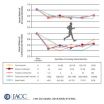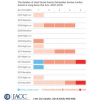(Press-News.org) Bottom Line: An electronic screening tool that starts with a single question to assess the frequency of substance misuse appears to be an easy way to screen teenagers who visited a physician for routine medical care.
Author: Sharon Levy, M.D., M.P.H., of Boston Children's Hospital, and colleagues.
Background: Substance use can cause illness and death in adolescents. Screening adolescents and intervening if there is substance use can reduce the burden of addiction. The American Academy of Pediatrics and other professional organizations recommend that primary care physicians screen adolescents for substance use.
How the Study Was Conducted: The authors examined use of an electronic screening and assessment tool to triage adolescents into four categories regarding nontobacco substance use: no past-year alcohol or drug use, past-year use with a substance use disorder (SUD), mild or moderate SUD and severe SUD. The tool also can assess tobacco use. The study included 216 adolescent patients (ages 12 to 17 years) from outpatient centers at a pediatric hospital who completed the screening from June 2012 through March 2013. The screening started with a single question that assessed the frequency of past-year use in eight categories of substances, including alcohol, marijuana, cocaine and prescription drugs. Patients who reported use were asked additional questions.
Results: For nontobacco substance use, 123 patients (57.7 percent) reported no past-year use, 49 (23 percent) reported use but didn't meet the criteria for SUD, 22 (10.3 percent) met the criteria for mild or moderate SUD and 19 (8.9 percent) met the criteria for severe SUD. Sensitivity and specificity were 100% and 84% for identifying non-tobacco substance use, 90% and 94% for substance use disorders, 100% and 94% for severe SUD, and 75% and 98% for nicotine dependence. No significant differences were found in sensitivity or specificity between the full tool and the frequency-only questions.
Conclusion: "Our findings suggest that frequency screening questions are also a valid and efficient means of triaging alcohol and drug use into clinically meaningful risk levels in adolescents."
INFORMATION:
(JAMA Pediatr. Published online July 28, 2014. doi:10.1001/jamapediatrics.2014.774. Available pre-embargo to the media at http://media.jamanetwork.com.)
Editor's Note: The study was supported by grants from the National Institute on Drug Abuse. Please see article for additional information, including other authors, author contributions and affiliations, etc.
Editorial: Substance Misuse Among Teens, to Screen or Not to Screen
In a related editorial, Geetha A. Subramaniam, M.D., D.F.A.P.A., and Nora D. Volkov, M.D., of the National Institute of Drug Abuse, Bethesda, Md., write: "Strategies to disseminate the use of this validated screening tool would need to overcome barriers to perform routine screening in pediatric primary care settings."
"Among these barriers are the lack of knowledge on how to screen for substances of abuse, the lack of training in or familiarity with the management of adolescents with substance use problems, and the burden on pediatric physicians to treat these patients within the time constraints of busy practices. Perhaps an even bigger barrier to widespread adoption is the lack of an evidence base to clinically guide the pediatric physician when substance misuse is uncovered in an adolescent," the authors continue.
"The study by Levy and colleagues represents a major advance, yet only the beginning of a larger, urgently needed evidence-gathering process to inform the utility of screening and the adequate management of substance misuse in adolescents by pediatric primary care physicians," they conclude.
(JAMA Pediatr. Published online July 28, 2014. doi:10.1001/jamapediatrics.2014.958. Available pre-embargo to the media at http://media.jamanetwork.com.)
Editor's Note: Please see article for additional information, including other authors, author contributions and affiliations, etc.
Media Advisory: To contact author Sharon Levy, M.D., M.P.H., call Erin Tornatore at 617-919-3110 or email erin.tornatore@childrens.harvard.edu. To contact editorial author Geetha A. Subramaniam, M.D., D.F.A.P.A., call Sheri Grabus at 301-443-6245 or email media@nida.nih.gov
Electronic screening tool to triage teenagers and risk of substance misuse
2014-07-28
ELSE PRESS RELEASES FROM THIS DATE:
Dementia patients more likely to get implanted pacemakers, says Pitt study
2014-07-28
PITTSBURGH, July 28, 2014 -- People with dementia are more likely to get implanted pacemakers for heart rhythm irregularities, such as atrial fibrillation, than people who don't have cognitive difficulties, according to researchers at the University of Pittsburgh School of Medicine. In a research letter published online today in JAMA Internal Medicine, the researchers noted the finding runs counter to expectations that less aggressive interventions are the norm for patients with the incurable and disabling illness.
To look at the relationships between cognitive status ...
Non-endoscopic migraine surgery provides significant symptom relief
2014-07-28
A revised version of a surgical procedure to treat severe chronic migraine headaches led to significant symptom relief more than 90 percent of the time in patients treated at Massachusetts General Hospital (MGH). Physicians from the MGH Division of Plastic and Reconstructive Surgery report that more than half of 35 patients treated with the non-endoscopic procedure – all of whom had headaches associated with compression of craniofacial nerves – reported complete symptom relief a year later. The team's paper has received advance online publication in the journal Plastic ...
Gender disparities in cognition will not diminish
2014-07-28
The study, published in the Proceedings of the National Academy of Science, investigated the extent to which improvements in living conditions and educational opportunities over a person's life affect cognitive abilities and their implications for men and women.
"Our results show that there is no reason to expect all cognitive gender differences will diminish," says Daniela Weber, IIASA researcher and lead author of the study. "However, the findings from this study suggest that if women and men had equal levels of education, then we should expect a female advantage in ...
Running reduces risk of death regardless of duration, speed
2014-07-28
Running for only a few minutes a day or at slow speeds may significantly reduce a person's risk of death from cardiovascular disease compared to someone who does not run, according to a study published today in the Journal of the American College of Cardiology.
Exercise is well-established as way to prevent heart disease and it is component of an overall healthy life, but it is unclear whether there are health benefits below the level of 75 minutes per week of vigorous-intensity activity, such as running, recommended by the U.S. government and World Health Organization.
Researchers ...
Endurance runners more likely to die of heat stroke than heart condition
2014-07-28
Heat stroke is 10 times more likely than cardiac events to be life-threatening for runners during endurance races in warm climates, according to a study published today in the Journal of the American College of Cardiology. The authors noted the findings may play a role in the ongoing debate over pre-participation ECG screenings for preventing sudden death in athletes by offering a new perspective on the greatest health risk for runners.
Two of the most recognized causes of sudden death during an endurance race are arrhythmic death, sudden death usually caused by undetected ...
Learning the smell of fear: Mothers teach babies their own fears via odor, research finds
2014-07-28
ANN ARBOR, Mich. — Babies can learn what to fear in the first days of life just by smelling the odor of their distressed mothers, new research suggests. And not just "natural" fears: If a mother experienced something before pregnancy that made her fear something specific, her baby will quickly learn to fear it too -- through the odor she gives off when she feels fear.
In the first direct observation of this kind of fear transmission, a team of University of Michigan Medical School and New York University studied mother rats who had learned to fear the smell of peppermint ...
New study confirms water vapor as global warming amplifier
2014-07-28
MIAMI – A new study from scientists at the University of Miami Rosenstiel School of Marine and Atmospheric Science and colleagues confirms rising levels of water vapor in the upper troposphere – a key amplifier of global warming – will intensify climate change impacts over the next decades. The new study is the first to show that increased water vapor concentrations in the atmosphere are a direct result of human activities.
"The study is the first to confirm that human activities have increased water vapor in the upper troposphere," said Brian Soden, professor of atmospheric ...
Impact of Deepwater Horizon oil spill on coral is deeper and broader than predicted
2014-07-28
A new discovery of two additional coral communities showing signs of damage from the Deepwater Horizon oil spill expands the impact footprint of the 2010 spill in the Gulf of Mexico. The discovery was made by a team led by Charles Fisher, professor of biology at Penn State University. A paper describing this work and additional impacts of human activity on corals in the Gulf of Mexico will be published during the last week of July 2014 in the online Early Edition of the journal Proceedings of the National Academy of Sciences.
"The footprint of the impact of the spill ...
The bit of your brain that signals how bad things could be
2014-07-28
An evolutionarily ancient and tiny part of the brain tracks expectations about nasty events, finds new UCL research.
The study, published in Proceedings of the National Academy of Sciences, demonstrates for the first time that the human habenula, half the size of a pea, tracks predictions about negative events, like painful electric shocks, suggesting a role in learning from bad experiences.
Brain scans from 23 healthy volunteers showed that the habenula activates in response to pictures associated with painful electric shocks, with the opposite occurring for pictures ...
Cell's recycling center implicated in division decisions
2014-07-28
Most cells do not divide unless there is enough oxygen present to support their offspring, but certain cancer cells and other cell types circumvent this rule. Researchers at The Johns Hopkins University have now identified a mechanism that overrides the cells' warning signals, enabling cancers to continue to divide even without a robust blood supply. In the process, the researchers found that lysosomes — the cell's protein "recycling centers" — help govern cell division decisions. They also uncovered new evidence that certain drugs can halt the growth of tumors that have ...



